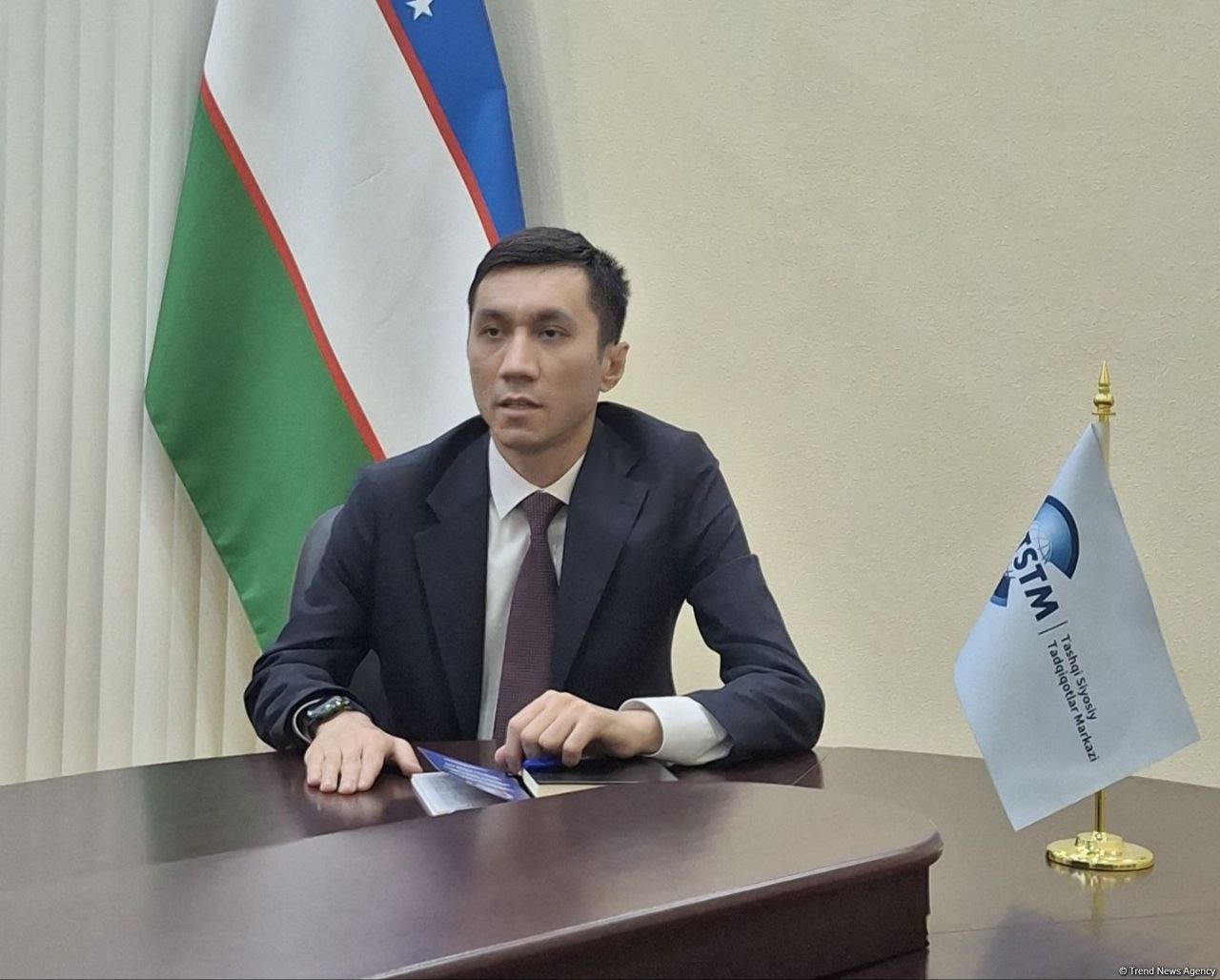BAKU, Azerbaijan, November 16. The Zangezur Corridor is becoming increasingly important for strengthening interregional ties and creating new transport and economic opportunities for Central Asian countries, Jahongir Saidov, Chief Researcher at the Center for Foreign Policy Studies in Uzbekistan, told Trend.
Saidov noted that the corridor serves as a strategic link connecting the South Caucasus and Central Asia and provides new logic for spatial interconnectedness between the two regions. "The Zangezur Corridor project is becoming increasingly important in strengthening interregional ties. On the one hand, it aims to enhance strategic cooperation among Turkic countries, and on the other hand, it serves as an important factor in transforming two key regions: the South Caucasus and Central Asia. This corridor not only creates new transport routes but also forms a new logic of spatial interconnectedness, becoming an important tool for linking interests, infrastructure, and transport systems," he said.
He emphasized the significance of Azerbaijan joining the format of the Consultative Meetings of the Heads of State of Central Asia, calling it a historic event that establishes a stable six-party cooperation framework. "This accession will deepen the centuries-old friendship between peoples and expand comprehensive collaboration in political, economic, transport, investment, energy, and cultural-humanitarian spheres," Saidov said.
The expert highlighted the role of the Middle Corridor and Azerbaijan’s infrastructure in shaping Central Asia’s transport and logistics strategy. "In recent years, the Middle Corridor and Azerbaijan’s infrastructure have become a key link in the transport and logistics strategies of Central Asian countries, providing a shorter route for delivering goods from Asia to Europe. Azerbaijan, thanks to its geographic position, acts as a key node on the East-West corridor. Azerbaijan’s infrastructure projects, such as the modernization of the Baku-Tbilisi-Kars railway and the expansion of the Baku International Sea Port, are aimed at enhancing the Middle Corridor’s potential. These changes open up new economic opportunities for landlocked Central Asian countries, primarily Uzbekistan," he said.
Saidov added that the Middle Corridor has proven itself as a vital transport artery connecting China and Central Asia with Europe through the Caspian Sea, the South Caucasus, and Turkey. He noted that Azerbaijan’s investments in ports, railways, and trade fleet modernization significantly reduce logistic bottlenecks and delays in transport, fully supporting the long-term strategic interests of Central Asian countries.
He also discussed the emerging energy cooperation, including the trilateral “Green Energy Corridor” agreement between Azerbaijan, Kazakhstan, and Uzbekistan. "The 'Green Energy Corridor' project is an initiative aimed at exporting renewable energy from Central Asia to Europe. Kazakhstan, Azerbaijan, and Uzbekistan are making joint efforts to create effective infrastructure to deliver clean electricity to the European market. The practical implementation of the project includes establishing a joint venture, building the necessary infrastructure, and integrating energy systems. Each participating country will focus on developing its capacities for solar and wind energy. For example, Uzbekistan aims to increase the share of renewable energy to 40% by 2030, creating a surplus suitable for export," he said.
Saidov emphasized that these efforts could make the three countries leading players in Europe’s energy transition, providing clean, stable, and affordable energy. "All three countries are actively developing the green energy sector, investing significant resources, and attracting international investment to expand solar and wind capacities. The Caspian Sea has substantial wind energy potential - 157 GW - which creates opportunities for both Azerbaijan and for Kazakhstan and Uzbekistan to develop and export renewable energy," he said.
The official also addressed the potential formation of a sustainable “Azerbaijan-Central Asia bloc” within broader Turkic integration. "Undoubtedly, a final consensus was reached in Tashkent. This is the result of active cooperation between Azerbaijan and Central Asian countries over recent years. Now the interaction has acquired a more pronounced character and institutional consolidation, reflecting mutual interest in strengthening political, economic, and cultural ties between the regions. Azerbaijan is now not just a partner in Central Asian integration but an active participant in regional interconnectivity, including the Turkic Union. In other words, today Baku organically complements our region, serving as a bridge between East and West, which is especially evident in the OTS format," he said.
Finally, Saidov highlighted the importance of the Zangezur Corridor for Central Asia’s economic model. "The Zangezur Corridor project not only strengthens links between Azerbaijan and Türkiye but also opens a new crucial route for Central Asian countries seeking more efficient access to European markets. Uzbekistan, as a rapidly developing economy, is interested in facilitating the movement of goods, and the new transport opportunities promoted by Azerbaijan open entirely different economic possibilities for Central Asia. It is precisely such pragmatic interests that make our cooperation stronger and more effective," he concluded.







